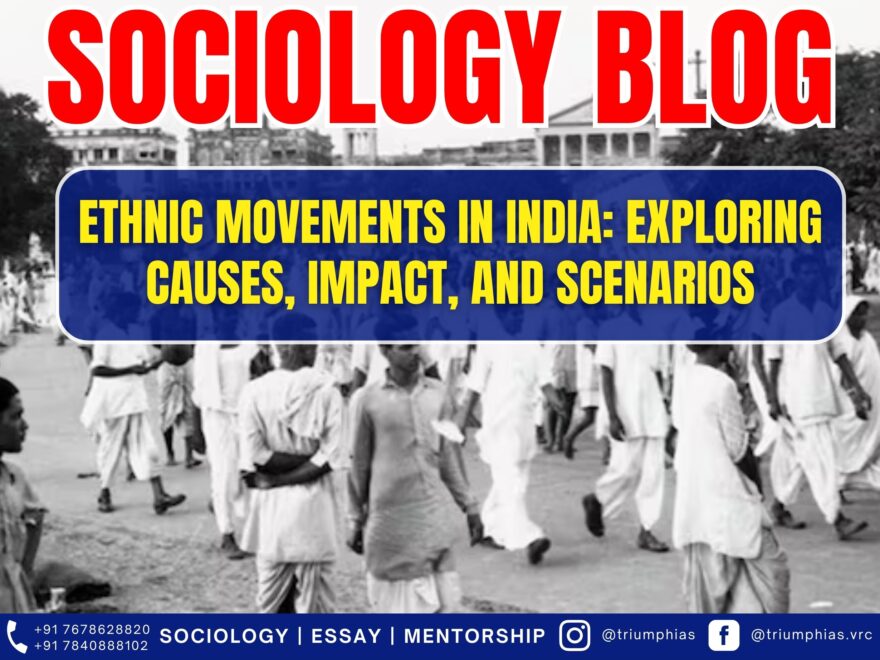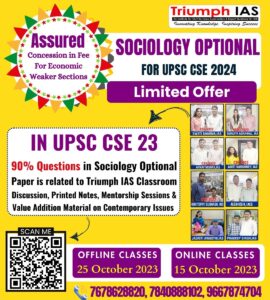Ethnic Movement in India.
Relevant for Sociology Optional for Civil Service Examination.
Paper 2: Unit-13 Social Movements in modern India
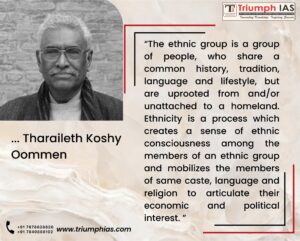
Ethnic Movement in India.
- India is a multi- ethnic, multi- religious, multi-cultural and multi-linguistic country where national unity is given priority. Different ethnic groups have been asserting their ethnic rights and privileges through different types of movements. Ethnic movements in Assam, Punjab, North-East states, West Bengal and Kashmir have created a separate consciousness for the minorities to establish their identity in these states. Some ethnic movements are democratic and peaceful while others are separatist movements engaged with ethnic violence. So ethnicity has been a prime issue in nation and Nation-State.
- Ethnicity is a dynamic process where individuals within a group recognize a shared identity. Ethnic groups do not have fixed territorial boundaries. Ethnic movements arise in response to perceived threats to shared attributes like language, culture, or identity. This collective identity forms the basis of ethnic groups, enabling them to pursue shared interests.
The Emergence of Ethnic Movements
- Inequality endorsed by government: Hechter & Okamoto says that inequality encountered by any individual, group or community which is endorsed by the government may incite them to erupt collectively against it and this marks the beginning of an ethnic movement. Ethnic movements also sparked due to threat to their distinct social identity.
- Colonial and Modern Ethnic Policies: Policies employed both during the colonial era and in contemporary times by the government have relied upon ethnic attributes like race, language, and culture as criteria for classifying ethnic groups, often resulting in differential treatment.
- Political Opportunities and Crisis: Disruptions in the established societal order, stemming from shifts in power dynamics, create political opportunities. National crises create an environment conducive for ethnic elites to mobilize various ethnic groups to partake in uprisings.
- Other Contributing Factors: Olzak says one factor for social movement is the construction of hierarchies among ethnic communities, a social construct that can lead to the suppression of one group by another.
- Diverse Causal Factors: The emergence of ethnic movements in India can be attributed to a multitude of causal factors. These factors include modernization, the dynamics of political economy, inter-community conflicts, and competition for limited resources, feelings of relative deprivation, the existence of social hierarchies, cultural disparities, and more.
- The origin and resurgence of ethnicity lie in intergroup contact, that is, when different groups come into one another’s sphere of influence.
- Major Factors Responsible for Ethnic Movements
- Rajni Kothari emphasizes that ethnic tension is the consequence of modernisation.
- Gail Omveldt opposed the romanticizing aspect of traditional India India for the reason that hierarchy has always been a dominating feature of Indian society and the claim that multiculturalism is a feature of Indian society is a myth.
- The crucial causal factors of ethnic movements in India are:
-
- The extreme competition for economy, the passion to safeguard age-old culture and the diverse cultural and linguistic groups.
- Unequal economic development which lead to the underdevelopment of certain groups and their marginalisation.
- Dipankar Gupta says that the ethnicity is basically a political process. Politicizing caste and religion, the chief components of identity formation, by political leaders for their political interests.
- Cohen has also argued that ethnicity does not require a cultural or historical explanation; contemporary politics and ‘structural conditions’ are the keys to understand the phenomenon
- There was growing concern among both linguistic and religious ethnic groups about their assimilation into the mainstream, which was seen as a threat to their ethnic identity.
- The defective developmental policies created a feeling of alienation among the ethnic communities which further forced them to dislocate from their traditionally occupied territory thus bringing miseries in their lives.
Various ethnic movements in India
- Punjab Ethnic Movement: The Khalistan movement aims to create a separate Sikh country, intensifying in the 1970s and 1990s. It resulted in the military operation known as Operation Blue Star and the 1984 anti-Sikh riots, followed by insurgency in Punjab, which was controlled by the Indian state in the early 1990s.
- North-East Ethnic Movements: Various ethnic movements in the North-east region include the Nagas’ struggle for an independent state (Nagaland), and Mizos’ demand for autonomy, leading to the creation of Mizoram as a state. These movements are driven by tribal identity and distinctiveness.
- Gorkhaland Ethnic Movement: The Gorkhaland movement in Darjeeling seeks a separate state for India’s Nepali-speaking citizens. It has seen leaders like Subash Ghising and Bimal Gurung advocating for Gorkhaland.
- Dravidian Movement: The Dravidian movement, led by E.V Ramasamy, aimed to establish a society with equal rights for backward castes. It focused on anti-Brahmanism and self-respect marriages, opposing Brahmin dominance and North Indian influence.
- Assam Ethnicity: Conflict in Assam involves indigenous Bodo tribals and ethnic Bengali Muslim settlers. The issues stem from immigration, leading to clashes and riots. Protests and demands for the detection and deportation of illegal immigrants have arisen, and relationships among indigenous communities are evolving to address the challenges.
Reference: Static Portion
Related Blogs…
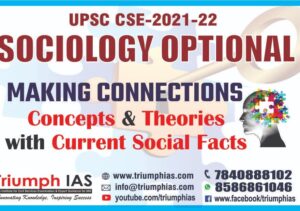 |
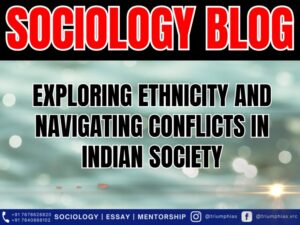 |
Frequently Asked Questions:
1. Question: Define the term “ethnic movement” and provide an example from India.
Answer: An ethnic movement refers to a collective effort by a group sharing common cultural, linguistic, or religious traits, seeking to assert their identity and rights; an example from India is the Khalistan Movement in Punjab.
2. Question: Identify the main objectives behind the Gorkhaland ethnic movement.
Answer: The Gorkhaland ethnic movement primarily seeks to establish a separate state for India’s Nepali-speaking population in the Darjeeling region, advocating for linguistic and cultural recognition and political autonomy.
3. Question: What was the Operation Blue Star, and which ethnic movement was it related to?
Answer: Operation Blue Star was a military action in 1984, aiming to remove Sikh militants hiding in the Golden Temple in Amritsar; it is related to the Khalistan movement, which sought a separate Sikh country.
4. Question: Mention a critical factor that triggered the emergence of ethnic movements in India, as discussed by Dipankar Gupta.
Answer: Dipankar Gupta emphasized that ethnicity is fundamentally a political process, wherein caste and religion, the key components of identity formation, are politicized by leaders for vested interests.
5. Question: What were the primary reasons for the Assam Ethnicity conflicts involving Bodo tribals and Bengali Muslim settlers?
Answer: The Assam Ethnicity conflicts primarily stemmed from issues related to immigration, land rights, and resource allocation, leading to clashes, riots, and evolving relationships among indigenous communities to address challenges.
6. Question: Briefly describe the role of the Dravidian Movement in terms of caste and societal structure.
Answer: The Dravidian Movement, led notably by E.V. Ramasamy, aimed to establish an egalitarian society, focusing on anti-Brahmanism and advocating for equal rights for backward castes, while also introducing reforms like self-respect marriages.
7. Question: Name the prominent ethnic movements in North-East India and specify one common objective.
Answer: Prominent ethnic movements in North-East India include the Nagas’ and Mizos’ struggles; a common objective was to gain autonomy and recognition for their distinct tribal identities and cultural uniqueness.
8. Question: What is the key argument of Gail Omveldt regarding traditional Indian society and multiculturalism?
Answer: Gail Omveldt opposed romanticizing traditional Indian society, arguing that hierarchy has always dominated it and dismissing the notion that multiculturalism is an intrinsic feature of Indian society as a myth.
9. Question: Briefly explain the social hierarchy factor as a contributing element to ethnic movements as suggested by Olzak.
Answer: Olzak suggests that the construction of hierarchies among ethnic communities, which often leads to the suppression of one group by another, is a key factor that can instigate social and ethnic movements.
10. Question: Identify one consequence of the unequal economic development factor within the context of ethnic movements in India.
Answer: One consequence of unequal economic development is the marginalization and underdevelopment of certain groups, leading to feelings of alienation and sometimes initiating ethnic movements as these groups strive for equality and recognition.
GS Related Practices Questions…
To master these intricacies and fare well in the Sociology Optional Syllabus, aspiring sociologists might benefit from guidance by the Best Sociology Optional Teacher and participation in the Best Sociology Optional Coaching. These avenues provide comprehensive assistance, ensuring a solid understanding of sociology’s diverse methodologies and techniques.
META TAGS:
Ethnic Movements, ethnic movements in india, ethnic movement in sociology, Punjab Movement, North-East Ethnic Movements, Gorkhaland Movement, Dravidian Movement, Assam Ethnicity, Ethnic Conflicts, Sociopolitical Impact, India, Ethnic Consciousness, Ethnic Rights, Political Crisis, Economic Development, Cultural Disparities, Khalistan Movement, Nagaland, Mizoram, Multiculturalism, Political Economy, Identity Formation, Social Hierarchies, Bodo Tribals, Bengali Muslim Settlers, Anti-Sikh Riots, Operation Blue Star, Unequal Development, Ethnic Violence, Political Mobilization

Why Vikash Ranjan’s Classes for Sociology?
Proper guidance and assistance are required to learn the skill of interlinking current happenings with the conventional topics. VIKASH RANJAN SIR at TRIUMPH IAS guides students according to the Recent Trends of UPSC, making him the Best Sociology Teacher for Sociology Optional UPSC.
At Triumph IAS, the Best Sociology Optional Coaching platform, we not only provide the best study material and applied classes for Sociology for IAS but also conduct regular assignments and class tests to assess candidates’ writing skills and understanding of the subject.
Choose The Best Sociology Optional Teacher for IAS Preparation?
At the beginning of the journey for Civil Services Examination preparation, many students face a pivotal decision – selecting their optional subject. Questions such as “which optional subject is the best?” and “which optional subject is the most scoring?” frequently come to mind. Choosing the right optional subject, like choosing the best sociology optional teacher, is a subjective yet vital step that requires a thoughtful decision based on facts. A misstep in this crucial decision can indeed prove disastrous.
Ever since the exam pattern was revamped in 2013, the UPSC has eliminated the need for a second optional subject. Now, candidates have to choose only one optional subject for the UPSC Mains, which has two papers of 250 marks each. One of the compelling choices for many has been the sociology optional. However, it’s strongly advised to decide on your optional subject for mains well ahead of time to get sufficient time to complete the syllabus. After all, most students score similarly in General Studies Papers; it’s the score in the optional subject & essay that contributes significantly to the final selection.
“A sound strategy does not rely solely on the popular
Opinion of toppers or famous YouTubers cum teachers.”
It requires understanding one’s ability, interest, and the relevance of the subject, not just for the exam but also for life in general. Hence, when selecting the best sociology teacher, one must consider the usefulness of sociology optional coaching in General Studies, Essay, and Personality Test.
The choice of the optional subject should be based on objective criteria, such as the nature, scope, and size of the syllabus, uniformity and stability in the question pattern, relevance of the syllabic content in daily life in society, and the availability of study material and guidance. For example, choosing the best sociology optional coaching can ensure access to top-quality study materials and experienced teachers. Always remember, the approach of the UPSC optional subject differs from your academic studies of subjects. Therefore, before settling for sociology optional, you need to analyze the syllabus, previous years’ pattern, subject requirements (be it ideal, visionary, numerical, conceptual theoretical), and your comfort level with the subject.
This decision marks a critical point in your UPSC – CSE journey, potentially determining your success in a career in IAS/Civil Services. Therefore, it’s crucial to choose wisely, whether it’s the optional subject or the best sociology optional teacher. Always base your decision on accurate facts, and never let your emotional biases guide your choices. After all, the search for the best sociology optional coaching is about finding the perfect fit for your unique academic needs and aspirations.
To master these intricacies and fare well in the Sociology Optional Syllabus, aspiring sociologists might benefit from guidance by the Best Sociology Optional Teacher and participation in the Best Sociology Optional Coaching. These avenues provide comprehensive assistance, ensuring a solid understanding of sociology’s diverse methodologies and techniques. Sociology, Social theory, Best Sociology Optional Teacher, Best Sociology Optional Coaching, Sociology Optional Syllabus.
Best Sociology Optional Teacher, Sociology Syllabus, Sociology Optional, Sociology Optional Coaching, Best Sociology Optional Coaching, Best Sociology Teacher, Sociology Course, Sociology Teacher, Sociology Foundation, Sociology Foundation Course, Sociology Optional UPSC, Sociology for IAS,
Follow us :
🔎 https://www.instagram.com/triumphias
🔎https://www.youtube.com/c/TriumphIAS
🔎https://t.me/VikashRanjanSociology
Find More Blogs…
| Compare and contrast Karl Marx’s and Max weber’s | Karl Marx- Historical Materialism |
| Talcott Parsons : Social system | Scope of the subject and comparison with other social sciences |

